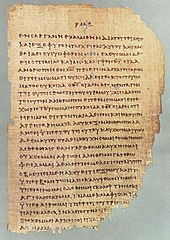----
The gospel of Matthew was written pretty recently after Jesus' death, rising, and going up into heaven. It was written from about the year 40. Jesus' crucifixion was about the year 30-34. It's the first of the four gospels and one of the three synoptic gospels. Matthew goes from Jesus' birth to His rising back into heaven. It also is the first book in the New Testament.
When it was written, the Christians were being persecuted in Jerusalem and some left. They had been hearing St. Matthew teach, but since he was in Jerusalem and they weren't, they needed some way of studying the Bible. So, St. Matthew wrote down what he had been teaching and circulated the writings.
 |
| An early manuscript from the Bible. It shows 2 Corinthians 11:33-12:9 and is one of the oldest New Testament papyrus manuscripts. |
St. Matthew was one of the twelve apostles. He was a tax collector before following Jesus. Tax collectors were generally disliked because they could take however much money from people as they wanted. They were hired by bidding for an amount of money they'd collect and then would have to collect that money and give it to the government. St. Matthew was probably one of the more educated apostles because he'd have to know math, Arameic, Greek, rhetoric, and had to be comfortable in different cultures. He was born in Galilee and died near Hierapolis or Ethiopia.
The gospel of Mark was written around the year 70. It's the second of the gospels. St. Mark wrote about Jesus' baptism through the Resurrection. Also, on Easter day when the entire account of the crucifixion and Resurrection is read, Mark's account is by far the longest. (And just for a nerdy thing that probably won't ever come in useful, in Mark 14:50-52, that was most likely St. Mark.)
St. Mark is Barnabas' cousin. (Barnabas shows up in Acts during the conflict between St. Mark, Barnabas, and St. Paul over a mission's trip.) When Jesus said that His body and blood were food and drink, lots of the disciples left, and St. Mark went with them. St. Peter talked to him, though, and St. Mark came back. He founded the church in Africa. Some of the liturgy the church there uses goes all the way back to him.
The gospel of Luke is the third gospel. It goes from Jesus' birth all the way to His Resurrection. Some of the parables are only found in Luke (like the one about the good Samaritan). It was probably written after Mark was and from about 75-84 (people say that it was written between 75-100, but St. Luke died near 84, so couldn't have written it after he died). Luke is the gospel with the most literary Greek.
St. Luke was a physician who lived in Antioch in Syria. He wrote Luke and Acts. He was probably an eyewitness of Jesus' life because he uses first person in his writings.
The gospel of John was written around 90 A.D. It begins with John the Baptist affirming Jesus and ends with the Resurrection. The very first verse in John uses a vague word. The English is "In the beginning was the Word, and the Word was with God, and the Word was God." John uses a confusing Greek word, logos, which everybody defines differently. Logos is used in John to describe God.
St. John is the brother of James (they're the sons of Zebedee). He lived longer than any of the other apostles and was the only other one other than Judas Iscariot who wasn't martyred. (Judas Iscariot killed himself after betraying Jesus.) He saw the Transfiguration. St. John taught Polycarp, who was an early martyr.
(Polycarp was arrested, but when the people came to arrest him, he got some food for them and prayed while they ate. He was put into a gladiator ring and the lions didn't attack him. Then, he was burned at the stake and the fire didn't burn him like fire burns people at the stake. It baked him like bread. Then he was stabbed. To Roman Catholic, Oriental Orthodox, Eastern Orthodox, Lutheran, and Anglican churches he's a saint, too.)